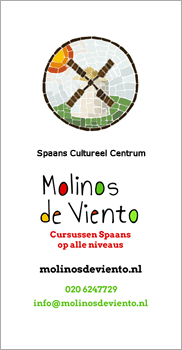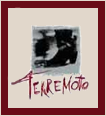And how was it sorted out in so little time?
While I was looking for another guitarist to patch things up for me, I called the technicians to postpone the recording, but they told me that they were already setting up the equipment. I thought of Dani right away, but at that time he was all busy with Paco de Lucía, with Concha Buika… and it moreover meant changing everything he had in his head because he's a totally different guitarist. It was impossible to look for somebody like Rafael, basically because there isn't anybody. And I called him up, he told me he was in El Arahal… and I saw my chance. "Get in your car and I'll be expecting you at seven in Granada", I told him. The only thing he knew was that El Cabeza had gotten sick and that he couldn't play for me, but I didn't even mention the recording to him. When he got there, he asked me what I was going to sing and I told him that I didn't know, that it was better not to look at anything. Then I explained to him that I was going to record it, but that if it didn't work out, it was OK.
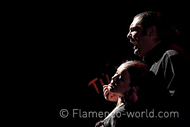 Did the repertoire come out then as you went along?
Did the repertoire come out then as you went along?
The songs came out as we went along up on stage. I had something thought out, but with Rafael. When Dani came, everything got changed around. Even the romance por bulerías at the beginning wasn't planned. Dani told me that halfway through the concert he was going to put the nut up on five in order for me to sing broadly, that he liked me singing there. And I told him that it would be better for us to start out like that and if we were capable of it, to leave the level there and not lower it. I felt so at ease that I didn't want to come off the stage; I just wanted to be allowed to sing. We reeled off the seven cantes there, which are really nine because there are malagueñas with abandolaos and tientos-tangos.
Weren’t you afraid to record live?
No. I was recording the album as a letter of introduction and where I could give the most truth is in the live performance. You can do a lot of things at the studio, but where I feel the best is up on stage. I thought that the warmth of the live show was a point in favor of the recording. As the circumstances were that I was given the Corral del Carbón, which moreover sounds really good, I had a flash of inspiration and recorded it, if it turns out well, good, and if it turns out badly, then it’s OK. I wasn’t entirely bad in it and Dani was overwhelming…
What does his guitar contribute?
When people listen to the album, they might think that it's all really set up musically, but as he came in out of the blue, it didn't seem appropriate to me to prepare anything in a couple of hours. I've known Dani since I began working professionally. His career has been a rocket at a really unbelievable level, with El Pele, with Arcángel, he's been with Paco de Lucía, now he's doing Mercé's "Ruido", where he's with the two Moraos… On a wedding cake, he's reached where the little figures are. Besides the fact that I love him as a friend, we understand one another musically, we've gone a long way together. He's a monster as a musician and a guitarist. You start to analyze him bit by bit and he's a monster. And Carlos and Lúa are also marvelous on clapping. I think the disc's warmth reflects the affection we have for each other. There's so much good feeling that you don't have to look at anything either, just enjoy one another.
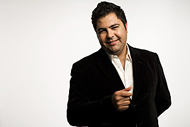 Talk to us about those cantes...
Talk to us about those cantes...
I have the cantes more or less structured in my head. And out of what I'd thought of, when Rafael didn't come, it all changed. The romance por bulerías was suggested by my colleagues and the rest are cantes I usually do live. But here, for example, I do Gayarrito's malagueña because, I don't know, at that moment you're trying to get into your cante and all of a sudden, some lyrics or a style pop into your head which you might not be very used to doing but they're there… and they come out in the end. The thing is I also think a lot of Enrique Morente, although my ways have nothing to do with him: I have neither the faculties, nor the timbre of his voice, nor many other things of his which I'd love to have. I do usually always do El Mellizo's double and the change to abandolao caught Dani by surprise because, I'll tell you, it was all improvised. Por alegrías, I sang what popped into my head. The soleá is what I usually sing, a route through Alcalá and Cádiz ending up with Triana, a structure which Antonio Mairena left and we keep moving around here more or less; it's our gospel. Por tangos, I lost my head and I remembered Gaspar, which is why it's called "Gaspar en la memoria". After Pastora, I really like Gaspar and his tientos have practically fallen into disuse; hardly anyone does them. In his time, Lebrijano drew up to it, but nobody has followed that style. I love him and specifically that way of doing tientos. I did lyrics por bulerías of the kind we do every day. And in the romance, I remember Perrate above all, who’s the one who fills me the most.
Perrate? He isn't a usual reference for a young cantaor…
I don't know. His ways are the ones I like most, that form of his, that cante clipped but so… We're involved with cante all day long and you get to the point where your head swells up. And then I put on a recording by one Gazpacho de Morón which Perrate sings in and Diego del Gastor plays for him, with Fernanda and Bernarda on clapping. That's like turning on the swimming pool's filter system; it puts things in their place for me. Perrate is one of the ones who fills me the most and more because of his taste than his form. And his cantes don't go down entirely badly with me, comparisons aside… he was a genius. I even love the way of cheering there: "Let 'em call us old!".
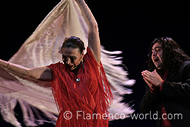 Are your references in any way present on the album?
Are your references in any way present on the album?
Everywhere. I like everybody, but you always like some more than others and people who, due to your features, you can approach a little more closely. I'd love to sing like Marchena, but he's like a radio in my voice; I don't have that speed he had or that form. I love Valderrama por taranta and he drives me crazy por guajira, but my way has nothing to do with that. I do stuff by them my way, but I wish I could… The Lord has given me the voice and the tone he's given me.
Like most of your colleagues, you're aware of tradition. Why aren't people more daring in cante?
Flamenco currently has twenty thousand ribbons tying it to the same point. First, you have to show that you know about this; it's like a daily exam. If you start firing shots up in the air… You don't shoot them up in the air, you see the clay pigeon and you shoot at it, but people don't understand that, people think you're firing shots up in the air. I think that's why we all do at least a first job which is as serious and as orthodox as possible, so that people see we're a little bit worried about this. And though we all say that we don't care, this carries weight and at the moment of truth, there are very few people who dare to say I'm going to do what I feel like and I'm going to throw out the prejudices. We're like really tied down.
But you’ve taken part in music projects as open as 'Silence-light' by Nacho Arimany…
On Nacho Arimany's disc, I had the great luxury of singing, besides with him, with Lionel Loueke, who's Herbie Hancock’s guitarist, and with Javier Vercher, who's a world-renowned saxophonist. I've also worked with Antonio Sánchez, Pat Metheny's drummer. They're joys which life and music and God give to you as you go along… and there are more and more of them. I also got involved in the 'Palo flamenco' project, with Basque txalaparta, which was carried out at the top flamenco and world music festivals. When your heart and your thoughts are flamenco, what you do is going to sound flamenco.
And do you feel like any encounters outside flamenco?
I don't have any project planned out yet. I do have a lot of stuff in my head that I'd like to do, but I don’t know if I'll have the chance. There's a project with Manuel Illán and the label to keep on making records. And I imagine we'll open up to other roads, but always from a flamenco point of view because I'm not a very versatile man either. There are artists who have the ability to open up to anything and they're good at anything. I don't see myself like that. What is true is that in every project I've gotten involved in, although they've been very diverse, what I've done in the end is to sing seguiriyas or soleá or malagueñas. I haven't tried to go beyond that. I can't see myself singing jazz. What I have seen and I have done, within all of this business, is to get into what I know how to do. I haven't tried to be avant-garde. But just that opens your head up to a great many other places. In my iPod I have Richard Bona, Khaled, Vinicius Cantuaria… and Mojama and Camarón and Borrico and Vallejo. I like music, but I like flamenco above all else. I do listen to a lot of stuff and when I listen to certain artists, I'm surprised by how far people's sensitivity can go. I remember when I was in Antwerp this past summer that at eleven o'clock in the morning there was a jazz group playing in the street, a guy started playing the flugelhorn and I was stunned. I was sitting there on a bench and it was better than if I'd paid sixty euros at a theater!
Interview by Silvia Calado. Madrid, December 2009
Translation: Joseph Kopec


